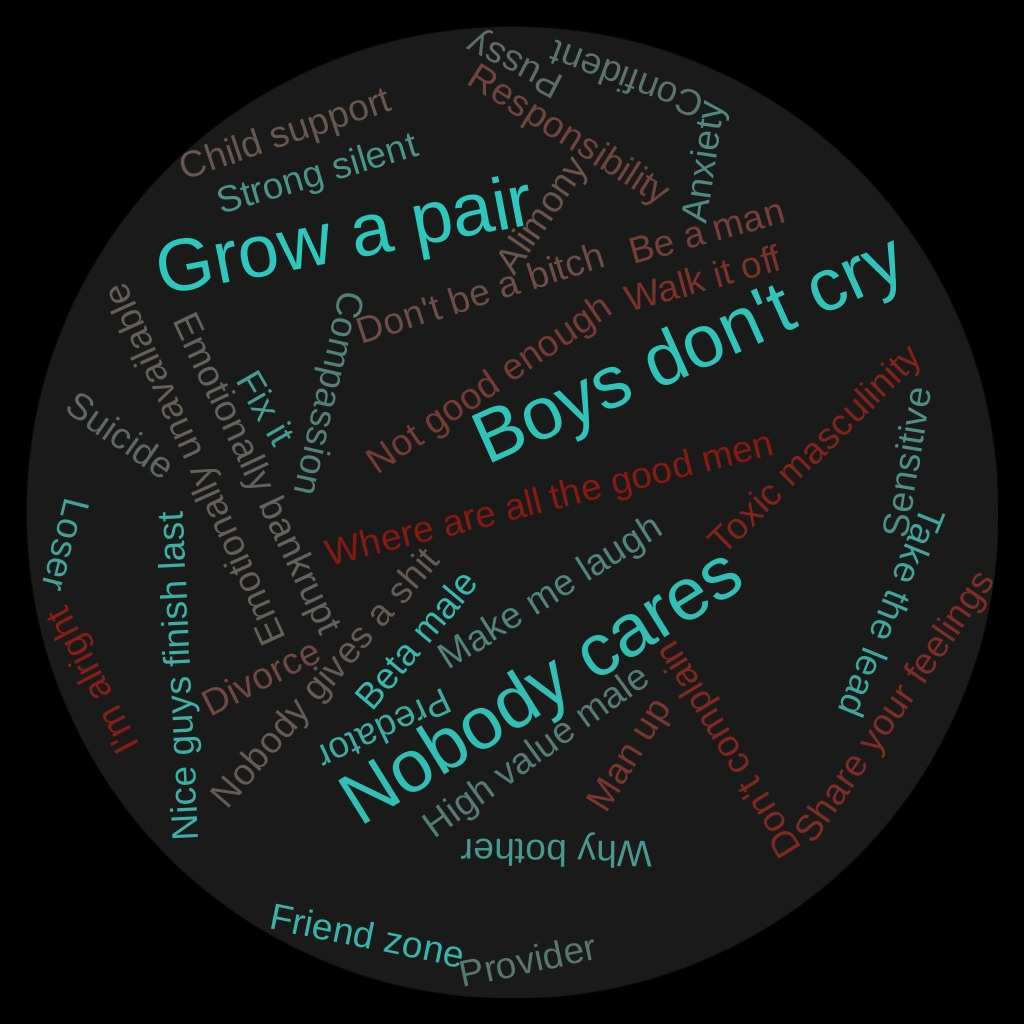Part 1: Men's Mental Health … masculinity in crisis
Many men are struggling in quiet desperation, holding in their innermost feelings. Why do so many Average Joes retreat behind a wall of silence? Complicated? Not really. (Part 1 of 2-part series)
There is a scene in Ron Howard’s 1989 comedy/drama Parenthood where family man Gil Buckman (Steve Martin), frustrated after being passed over for a promotion and stressed by incessant demands of marriage and fatherhood, heatedly prepares to leave home to coach his son’s Little League practice. Sensing his anger, wife Karen (Mary Steenburgen) pleads “Do you really have to go?”
Gil spits back …
“My whole life is ‘have to!’”
This poignant scene played out in everyday life, even in 2021. There are too many men today just like Gil. They grind every day, fulfilling obligations without affirmation. They roil like Gil, and occasionally, when pushed hard enough by their emptiness inside, lash out against a life unrequited. Mostly, however, men continue to internalize, keeping their innermost feelings and emotions in chains.
Quiet Desperation
Why do so many men do this? There are millions of men, a silent majority of Average Joes, who quietly bear the traditional role of providing and responsibility, tacitly knowing there will be little or no approbation. No parades, no ribbons, no “recognition” months for Average Joes. They work, they soldier on, detached, deadpan, without complaint. Joe is either unwilling to vocalize or incapable of open expression. Inside there is a quiet war between storm and stoicism. Ask him, and he’ll say he’s alright.
“When you hear a man say ‘I’m alright,’ he’s not alright.” – Anonymous
Why are so many men living in quiet desperation? This is 2021, not 1955. Why are so many Average Joes walking around distant and damaged? Have not social codes and enlightenment granted acceptance of the expressive male?
Sadly, the answer is no. And for a number of reasons. Today's cultural environs have been angling traditional institutions over the past couple of decades toward intersectionality, identity politics, and a radical turn against “The Patriarchy.” Average Joe has descended to the bottom of the hierarchy totem, demonized, silenced and socially emasculated.
Ironically, Average Joe doesn’t even know what “The Patriarchy” means.
Nobody’s Listening
It has been a quiet but steady decline. And nobody’s listening. At least not to Joe.
A Men’s Health 2019 study of 3,500 men, a mix of the married, unmarried and divorced — mostly middle class — reveals a shocking level of antipathy. When asked the question “when you are struggling, why don’t you reach out?” more than 2,000 Average Joes responded cynically. A sampling of responses ….
“It is what it is.”
“What’s the point?”
“My emotions and feelings don’t matter.”
“Who’s gonna listen?”
“I’m a man. Nobody gives a shit.”
Worst yet, when compelled to speak up or reach out when most vulnerable, Joe earns the inescapable label. “Man up!” he is told. “Grow a pair.” “Don’t be a bitch!” Unfortunately, this bravado often comes from an overbearing and insufferable brother-in-arms.
Women on Men: Mixed Messages
Complicating the problem are the mixed messages men receive from women. Women are accustomed to the “feeling’ game. In fact, they are hard-wired to it. From one side of their mouths comes their natural inclination towards nurturing and compassion: “Why don’t you express your feelings?” she implores.
However, many women – more than will admit – privately talk a different talk. Even with her outward posture of sympathy, subconsciously there exists in many women antipathy for evocative men. And though not openly derisive, their sentiment is no less damning. Deep down many women view the sensitive man as weak, emotionally immature, needy, and inadequate. He tries, often awkwardly, to open up. But too many women view him as a “simp,” okay as a friend but unsuitable as a mate.
… Deep down many women view the sensitive man as weak, emotionally immature, needy, and inadequate …
Worse yet … a commonplace testimony from men: Women often use a man’s feelings against him.
You may shake your head unconvinced. But believe it. For many men, this perception is reality. Outwardly they shrug off their problems. Inside, a lot of these Joes are broken and have been conditioned to believe nobody can help pick up the pieces.
Commitment: A thing of the past
“The first time a man receives flowers, it’s at his funeral.” — Online Average Joe
The marriage rate at the end of World War II was at an all-time high – 16 marriages per 1,000. In 2020, the ratio was down to 6 per 1,000. Since the turn of the century (21st, that is) the population in the U.S. has increased from 281.4 million to 328.2 million, yet over that 20 years the number of marriages has actually decreased from 2.3 million to just over 2 million. In 1950, more than 80 percent of U.S. households were occupied by married couples. Today, it has plummeted to 49 percent. (Source: CDC/NCHS National Vital Statistics System) America also is realizing growing numbers of women and men living alone, and a concurrent increase in unmarried cohabitation.
The reasons for the declining numbers vary, though the shift coincides with Third Wave Feminism (b. 60s to early 70s), in particular passage of Title IX of education amendments in 1972), increases in female education and labor force participation, women’s economic and sexual independence (i.e. birth control and Roe v. Wade) and gender equality.
These numbers reveal a significant transformation in male-female commitment. They also suggest a profound modification of traditional marital roles and a corresponding devolution of male status.
Toxic Masculinity
Sometimes, not knowing how to express himself and being fearful of the labels, the inner conflict results in acting out physically, or misspeaking. If Joe’s voice is strong, vocally forceful, he then becomes a threat. He becomes toxic.
Toxic Masculinity: (Generic) When a male who is acting aggressively, especially if it is oppressive toward women. (Expanded) The term has expanded to include all traits of what is considered traditionally masculine, like mental and physical toughness, competitiveness, stoicism, self-sufficiency, dominant (aka “alpha male), sexcual promiscuity and emotional insensitivity.
In today’s cultural ecosystem, men often are feared, even if by tone or bearing only. Why? Because biologically he is bigger, stronger, and dominant. By sequitur, masculinity became dangerous.
So … is the “good man” a feminist?
Where are all the good men? First, it might be expeditious to ask when and how did all this happen so quickly? What is the virtue of making relations between the sexes so flawed that the male half of the species could be treated as though it was riddled with cancer? Why was there a sudden war waged on masculinity?
The #MeToo movement didn’t help. That crusade emanated with the presupposition that women are at a distinct disadvantage in navigating a male-dominated and challenging world. They are physically weaker yet wholly bound to child-bearing and propagation of the species. They are subject to society’s often unattainable standards of beauty all the while dealing with highly-charged and erratic hormonal chemistry. These are colossal burdens to bear, no doubt.
So the answer was the social justice push for the “empowerment” of women. The rise of Fourth Wave Feminism. Thus ensued a celebration of all things female … days, even full months of “Celebration,” marches, ribbons, Awareness(es) movements of all stripes. Certainly society is better for it; equality is humanity’s most morally virtuous goal. However, in so doing, Average Joe, the nice guy grinding it out and holding it in, the provider – the strong but silent type – quite by accident became collateral damage. No parades for him.
Is Average Joe a Feminist? Don’t bother asking. He’ll just say he’s alright.
##






